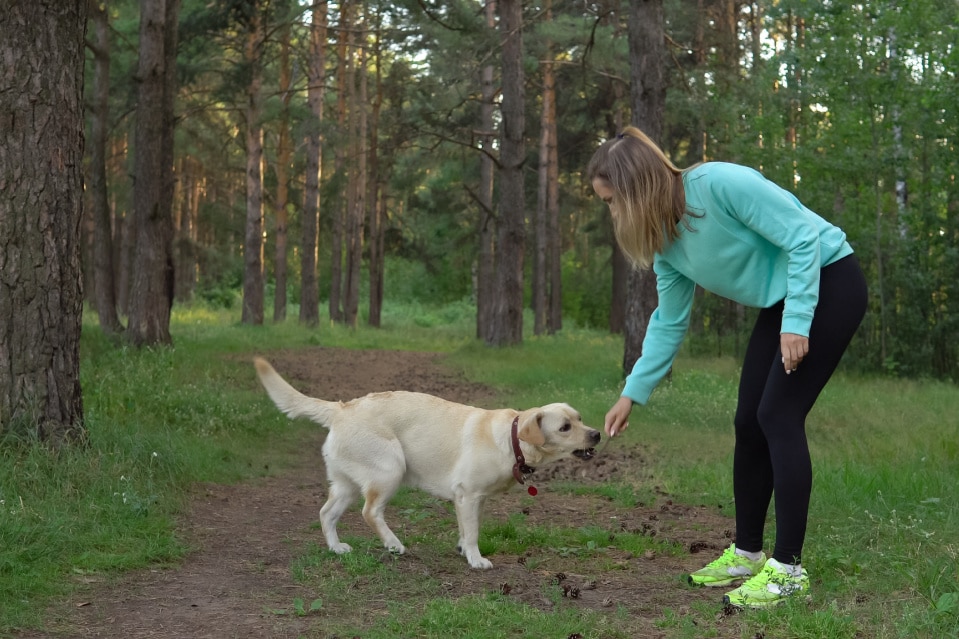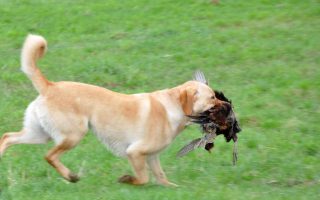Training a Lab puppy not to bark is, perhaps, a common question that many canine owners share.
After all, whether or not you are bringing a Labrador Retriever puppy home for the first time, it will take some time for your Labrador pup to adjust to living with you.
Because of this, you may notice that your Labrador Retriever pup keeps barking at absolutely everything.
While this is only a normal occurrence, you may want to minimize this, and so, you may be searching for answers on how to train a Lab puppy not to bark.
Here is a quick look at what you need to learn.
Know why your Labrador puppy is barking
Sometimes, your Lab pup wants to bark because it is natural for them. They may bark as a way to communicate with you.
For instance, they may bark because they are excited or want to go out to use the bathroom.
However, there are also other reasons why your Labrador Retriever puppy will bark, which means you may have to approach the problem in a different way.
Common reasons why your Lab puppy is barking includes:
- Trauma
- Fear and uncertainty
- Loneliness or boredom
- Anxiety
- Wanting attention
Check out this post to learn what are the other reasons that cause your Labrador pup to bark.
Training a Lab puppy not to bark
Here are some ways to help you on how to train a Lab puppy to stop barking:
1) Ignore them.

Most Lab puppies will start to bark when you put them into their crate. They may want to stay outside, but you need to learn how to properly discipline them when training a Lab puppy not to bark.
Therefore, you should not coddle them when it is nighttime, and they need to go into the crate. Turn around and ignore your puppy instead.
You can also ignore them when they are barking for something that they want, but they do not need right away.
Ideally, you should not leave the room right away because they may develop separation anxiety.
However, you cannot give in to what they want.
How long you ignore them will depend on you. Some people wait between 5-20 seconds before they pay attention to their dog again.
Typically, you can wait until they stop barking, and then you can pay attention to your Lab.
Your puppy is like a child; they will eventually learn that it is time to go to sleep when they are in their crate.
It may take some time, but your Labrador puppy will slowly mature and learn to stop barking when they are in their crate.
2) Reward appropriately.
If your dog barks, and you give them what they want right away, they will think that barking is fine.
They will bark whenever they want something because they think you will give in.
However, take note that you need to learn how to reward your dog appropriately.
For instance, if they want more food but already finished their meal, they may start barking. Instead of filling their bowl again, you can try the first tip of ignoring them.
If your dog stops barking and behaves, you can pay attention to them again. You can praise them for not barking and give them a treat.
If you are training them on how to bark and stop on command, that is when you can give them treats.
Every time they listen to your command, they can get a treat.
3) Never yell.
Some dog owners may get frustrated and yell at their dogs to be quiet. However, that is not good for them mentally as it can make them feel sad and fearful.
They may not understand why it is bad for them to bark for no reason.
Additionally, yelling almost never works. Dogs may assume that you are barking with them, so they will just keep barking.
Ignoring your dog or telling them to sternly be quiet is usually more effective than yelling.
4) Tell your whole family.
Your dog will be very confused when you tell him that it is not okay to bark all the time, but other family members encourage him to bark.
While Labs are smart dogs, they will not know what to do if several people are telling him to do different things.
Let other household members know that you are trying to make your Lab puppy stop barking excessively.
Tell them about the techniques that you are doing so they will not delay your dog’s progress.
Consistency is key in your dog’s training, so everyone needs to know what you are teaching your Labrador.
5) Get rid of triggers.
Some things will trigger your dog to bark. For instance, many dogs love to look through the window and bark at anyone passing by.
You can close the curtains so they will not see that. That way, they will be less motivated to bark at random people.
It may also be helpful to keep your dog inside. You do not want to leave your dog unsupervised for a long time, especially if they are still a puppy.
6) Get them used to new things.
Some dogs will bark because they are excited or do not know what something is.
You need to teach your dog how to get accustomed to certain things so they will be less tempted to bark.
For instance, they may bark every time they see a dog in the park. You can slowly introduce them to new dogs—which is also great to teach your Lab puppy social skills—so they will eventually get used to the idea of being around other dogs.
You can also reward them when they are quiet so they know that they are behaving properly.
7) Lots of exercising
Many puppies will bark because they are bored and hyper. Labradors are high-energy dogs, and they need to do lots of exercises to use up all that energy.
Make sure that your puppy plays and walks enough each day. It will make them feel less tempted to bark.
As we have mentioned in our previous post, most Lab puppies will need around 5 minutes of exercise for each month of their lives.
Then, they can play up to twice that amount a day (if they want to).
For example, 5-month old puppies can play for 25 minutes at a time, and they can do that up to twice a day.
Therefore, they can play for a little less than an hour a day. You can increase and decrease that amount depending on how your Lab puppy reacts.
You can also leave lots of fun, interactive toys around so your Lab can keep busy.
There are lots of puzzle toys like KONG toys that can keep them busy for an hour or two if you cannot play with them.
To sum up
If you want to learn how to train your Labrador Retriever puppy not to bark, positive reinforcement is the key to go.
To go about this, we have enumerated a number of tips above for your guidance and reference.
Bear in mind, however, that it can take a bit of trial and error before you can come up with the best way of training a Lab puppy not to bark.
Just be patient. If you need a helping hand, be sure to seek professional advice.







